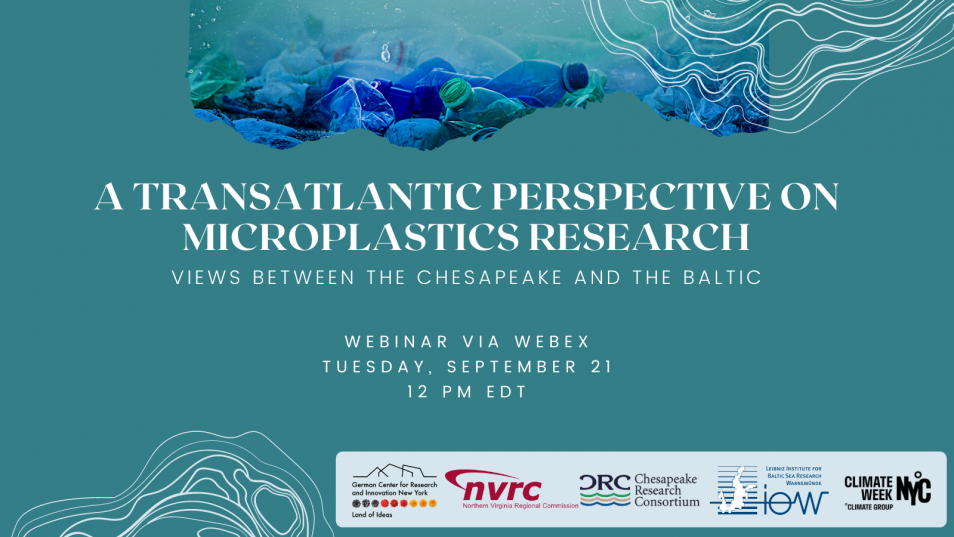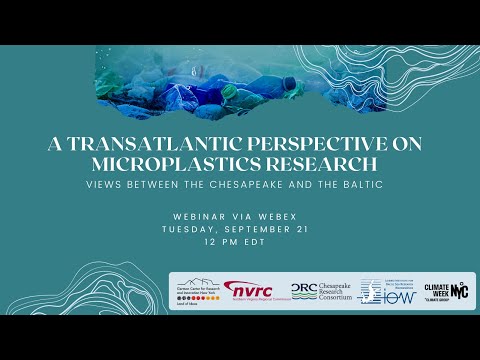A Transatlantic Perspective on Microplastics Research

Views Between the Chesapeake and the Baltic
The Chesapeake Bay is home to 516 wastewater treatment plants whose pollution, stemming from microplastics, is causing both short- and long-term damage to the delicate ecosystems within the Mid-Atlantic coastal region, as well as the humans who live there.
Beyond these threats, microplastics and their management pose danger to the infrastructures and resources surrounding the waterways, their environs, and the communities therein. Issues like long-term microplastic monitoring programs and how best to interpret microplastic pathways present major concern to scientists today.
Across the Atlantic, the Baltic Sea region is experiencing a similar set of challenges. To tackle this, the Leibniz Institute for Baltic Sea Research has spearheaded an initiative to improve scientists’ understanding of the ecological impact of microplastic accumulation and meso and microplastic pollution in the waters.
Through comprehensive studies and research efforts, portions of the research are translating into innovative policy responses and tools, often on the local level.
Please join the German Center for Innovation and Research, the Leibniz Institute for Baltic Sea Research, the Chesapeake Research Consortium, and the Northern Virginia Regional Commission for a webinar on Tuesday, September 21, 2021 at noon EST. The event will feature a conversation on the state of applied research on microplastic mitigation in the Baltic and Chesapeake Bay regions. A roundtable discussion will provide insight from researchers in both the Chesapeake Bay and Baltic Sea regions into the following areas:
- Comparisons of the design and implementation of microplastics monitoring programs between the Baltic and the Chesapeake
- Differences and similarities of research into microplastics pathways in the Baltic and Chesapeake Bay
- Considerations about the adequacy of infrastructure resources available to process microplastic samples
- Evaluation of Governmental structures and financing for research in the Baltic Sea/Chesapeake Bay on single-use plastics and microplastic mitigation
- Applied research in the Baltic Sea/Chesapeake Bay as it relates to microplastics and wastewater treatment/urban source conveyance
Event Recording

To play the video, click the thumbnail. Once activated data will be transmitted to the respective provider. Watch on YouTube
Agenda:
- 12:00 Welcome/Introduction
Dr. Kathrin DiPaola, German Center for Research and Innovation
Dr. Dale Medearis, Northern Virginia Regional Commission - 12:05 View from the Chesapeake
Dr. Denice Wardrop, Chesapeake Research Consortium - 12:25 View from the Baltic
Dr. Gerald Schernewski, Leibniz Institute for Baltic Sea Research - 12:45 Q&A
Dr. Kathrin DiPaola, German Center for Research and Innovation
Dr. Dale Medearis, Northern Virginia Regional Commission - 1:15pm Close
*All times in Eastern Daylight Time
Our Experts:

Since 2007, Dr. Dale Medearis has worked as a senior regional planner for the NVRC. He currently co-leads the NVRC’s regional climate mitigation, resiliency and international programs. Prior to working for NVRC, Medearis spent approximately 20 years at the Office of International Affairs, U.S. Environmental Protection Agency (EPA), in Washington DC, and helped manage the Agency’s programs for urban sustainability, Eastern and Western Europe, the OECD, and Middle East. Medearis has a Ph.D. in Environmental Design and Planning from Virginia Tech University, an M.S. in Cartographic and Geographic Science from George Mason University, an M.G.A. in Government from the University of Pennsylvania, and a B.A. in International Relations from the University of Redlands.Dr. Dale Medaris

Prof. Dr. habil. rer. nat. Gerald Schernewski is the Head of Coastal and Marine Management Group at the Leibniz-Institute for Baltic Sea Re-search Warnemünde, Professor at the Department of Ecology and Environmental Sciences at Klaipeda University, and head of the Coastal Management Group at the Marine Science and Technology Center in Klaipeda, Lithuania. He is the author of over 100 publications on a wide spectrum of applied coastal and marine research. As international expert on coastal research and management issues for many organizations, he is involved in several national working groups focused on Marine Strategy Framework Directive implementation.Dr. Gerald Schernewski

Denice Heller Wardrop was one of the first Systems Engineers to graduate from the University of Virginia, which she followed with an MS in Environmental Sciences from the same institution. She practiced as a consulting environmental engineer for over a decade before moving to State College PA, embracing football as well as basketball, and finishing a PhD in Ecology at Penn State. In addition to her role as Executive Director of the Chesapeake Research Consortium, she is a Research Professor of Geography and Ecology. Her discovery areas are wetlands of all kinds and landscape ecology, and she works a great deal on how human activities impact the ability of natural systems to provide ecosystem services. She passionately supports humans and aquatic systems finding ways to bring out the best in each other.Dr. Denice Wardrop
Event Information
September 21, 2021, 12:00 PM to 1:15 PM
Webex
Organizer(s): German Center for Research and Innovation (DWIH) New York
